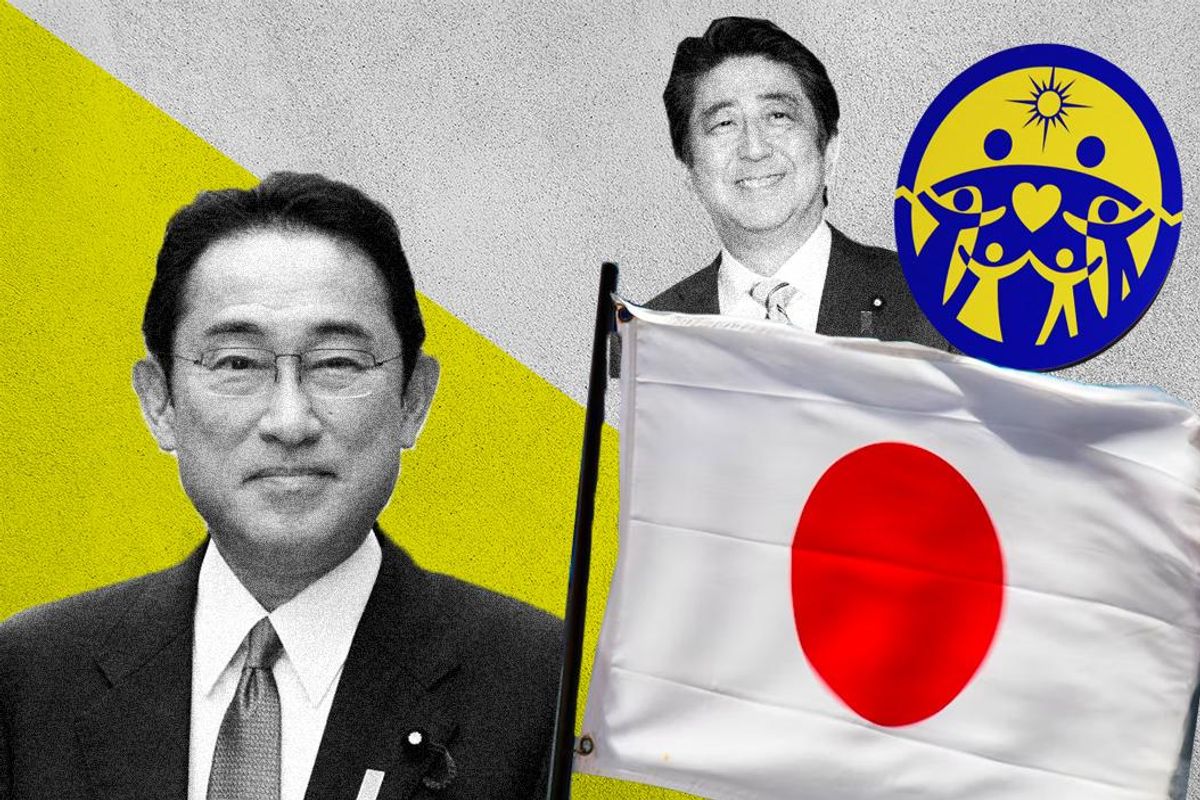When Japan’s Prime Minister Fumio Kishida reshuffled his cabinet for the first time since former PM Shinzo Abe’s assassination earlier this summer, it was a response to his falling approval rating. His government was struggling to tame rising COVID infections and acute inflation.
But it was also seen as damage control for the ruling Liberal Democratic Party’s ties to the controversial Unification Church. Kishida fired cabinet ministers linked to the cult-like religious movement born in South Korea whose members are known as Moonies (after founder Sun Myung Moon).
Although the PM also promised only to appoint future cabinet members who agree to review their relationship with the church, it wasn’t enough. After his popularity plummeted 16 percentage points in just a month to 36%, its lowest level since he took power, Kishida this week demanded all cabinet members review their past ties to the religious group.
The Moonies hit the spotlight after Abe’s alleged assassin blamed the church for his family’s financial ruin. The revelation that over 100 national politicians — most of them LDP lawmakers — have ties to the church also came as an ugly surprise to the public, especially as Japan’s constitution calls for the separation of church and state.
Kishida dismissed then-Defense Minister Nobuo Kishi, Abe’s younger brother, who wasn’t a member of the church but received help from it in past elections. The same was true of Koichi Hagiuda, who was replaced as economy minister.
Abe’s assassination triggered a public outcry against the church's political power. According to a recent poll, almost 90% of the Japanese people want the ruling party to better explain its ties to the Moonies. Strikingly, less than 7% accept Kishida’s explanation that there’s no organizational relationship between the LDP and the church.
Since the reshuffle, at least 20 of 54 lawmakers appointed as deputies to cabinet members have confirmed links to the church.
But Kishida is not severing ties completely. For instance, the ousted Kishi will likely become a special adviser to the PM on national security issues, effectively serving as a direct line to Kishida, and Haguida has been asked to head the LDP's policy research council, an influential party position.
The cabinet reshuffle was a classic move in Japanese politics to change a negative news cycle, says Eurasia Group’s lead Japan expert David Boling. “But this time the Japanese people said: 'not so fast.'”
What’s more, the PM reportedly knew that the replacements for many of the ousted ministers carried some of the same baggage, which for Boling is hardly a surprise. In other words, the Moonies are not really out of power — at least not yet.
"Kishida is between a rock and hard place," Boling says. The PM has to make the impossible choice between appointing experienced people despite their past ties to the church, or inexperienced ones who are free from the Moonie taint.
Still, the Japanese public clearly “wants a clean break."
What’s the big deal about the Moonies and their relationship with Japan's ruling party? The ties between the LDP and Moon’s church go back to the 1960s, when the South Korean pastor expanded to Japan.
In the 1970s, Moon and Abe’s grandfather, Nobusuke Kishi (a former PM and LDP founding member), co-founded an offshoot of the religious movement to confront the spread of communism during the Cold War. Both the LDP and Moon were staunchly anti-communist and deeply conservative.
Japan “has been remarkably fertile ground for so-called 'new religions.' If one thinks of the Unification Church in those terms, it is less surprising that it took root and gained political ground,” says Boling.
Over the years, the relationship evolved into one of mutual pragmatic benefit. The church would pay for LDP members to speak at their events, and in return, they would obtain the material support and manpower via donations and volunteers for campaigns that help meet Moonie political objectives, which often align with the ruling party’s.
“The LDP helped the church gain a sense of legitimacy in Japan,” says Charles T. McClean, a Japan researcher at Yale University’s Council on East Asian Studies. And that legitimacy translated into an economic windfall for the Moonies.
In little over half a century, Moon’s church has built a multibillion-dollar global business empire that owns the conservative Washington Times newspaper Moon founded, the New Yorker hotel in the Big Apple, and other vast real-estate assets. The Moonies supported Richard Nixon’s presidential campaign through organized prayer breakfasts and rallies, and in the 1980s the church attracted controversy for cozying up to America’s New Right.
Despite these notable connections, most of the church’s wealth comes from Japan. Japanese members have traditionally provided as much as 70% of the Unification Church’s financial resources, later funneled via South Korea to finance Moon’s ambitions in the US and elsewhere.
The Moonies are notorious in Japan for their so-called “spiritual-pressure sales” method of extracting donations through manipulation and cajoling, bankrupting many of the faithful – like the mother of Abe’s suspected killer.
So, what’s next for politicians tied to the church? For McClean, the cabinet shakeup was “a dam to prevent leaks before it becomes a larger flood.” But the bigger question is whether the continuing ties between the LDP and the church will have severe consequences for Kishida and his party's future.
The opposition Constitutional Democratic Party has already denounced Kishida’s reshuffle as a cover-up. (A dozen CDP lawmakers have admitted to having church ties, but the LDP has gotten most of the flak because it has governed Japan for most of the country’s postwar history.)
The overlap of religion in politics and business is standard practice in Japan, where some 180,000 groups are officially registered as religious corporations. The LDP is just one of the many parties that employ religion to raise the funds and votes necessary to thrive.
Komeito, the LDP’s junior coalition partner since 1999, draws almost all of its financial support from the Buddhist group Soka Gakkai, with eight million followers just in Japan.
The LDP and Komeito have had a strained alliance in the past, and with intense scrutiny over the LDP’s involvement with the church, Komeito may feel an increased threat to its survival. But McClean says the LDP depends on Komeito to campaign because the ruling party lacks its partner’s strong grassroots ability to turn out the vote, not to mention the Soka Gakkai constituency.
“It’s hard to predict how much the current scandal will negatively impact the LDP over the next few months,” McClean explains. “At least through Abe’s state funeral, I don’t see it going away … we’ll definitely be talking about it over the next month.”
Boling however, sees it lasting longer: “The opposition parties will keep cranking up the heat on Kishida. Japanese media has been aggressively reporting on the LDP-Unification Church connection, and they’ll continue to shine a glaring light on it.”
Still, the Moonies are just one of Kishida’s growing problems. Together with COVID, soaring inflation, and a majority of Japanese citizens opposing the taxpayer-funded state funeral planned for Abe on Sept. 27, things are looking bad for the PM in the near term.
“Kishida must focus on the economy like a laser beam,” says Boling. “The top issue by far is the economy — Kishida ignores that at his peril.”


















